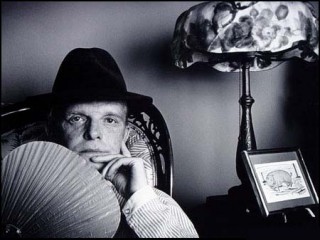
Truman Capote biography
Date of birth : 1924-09-30
Date of death : 1984-08-25
Birthplace : New Orleans, Louisiana, USA
Nationality : American
Category : Arts and Entertainment
Last modified : 2010-05-27
Credited as : Nonfiction Novelist , Breakfast at Tiffany's , In Cold Blood
Capote rose above a childhood troubled by divorce, a long absence from his mother and multiple migrations. He discovered his calling by the age of eleven, and for the rest of his childhood he honed his writing ability. Capote began his professional career writing short stories. The critical success of one story, "Miriam" (1945), attracted the attention of Random House publisher Bennett Cerf, resulting in a contract to write Other Voices, Other Rooms (1948). Capote earned the most fame with In Cold Blood (1965), a journalistic work about the murder of a Kansas farm family in their home, a book Capote spent four years writing. A milestone in popular culture, it was the peak of his career, although it was not his final book. In the 1970s, he maintained his celebrity status by appearing on television talk shows.
Claiming he had written a novel by the age of nine, Truman Capote knew he would be a writer at a young age. Writing across genres, from the short story, to the novel, to the nonfiction novel (which he coined), Capote captivated not only the literary and theatrical, but the mainstream masses like no other artist.
At the age of four, just before entering school, Truman had learned how to read. By eight years old, he began to write stories and by eleven, he claimed he wrote six to nine hours everyday. Critics even believe it to be true because at age ten he won the prestigious Mobile Press Register short story award.
In 1933, he moved with his mother and stepfather to New York. In high school, Capote wrote for the school’s newspaper and literary journal. At the young age of 17, Truman quit college, claiming university could teach him nothing and only took away his writing time. He began working for The New Yorker – a small, but beneficial career that taught him the inner workings of the magazine publishing world.
In the early 1940s, Capote began writing and perfecting his short story art. In only three years, he began publishing stories for magazines that published the best short story fiction and nonfiction in the country, namely: The Atlantic Monthly, Harper’s Bazaar, Harper’s Magazine, and of course, The New Yorker. And, in 1945, he won an O. Henry award for his short story works.
He soon published his first book Other Voices, Other Rooms under an advance given to him by Random House. The book became an instant bestseller and launched Capote’s career into high gear. He soon published A Tree of Night and Other Stories, which also became an instant success. He then traveled to Europe and wrote a collection of travel essays that were published, along with theatrical pieces and his first nonfiction collection of articles called The Muses are Heard.
One of Truman Capote’s most famous works is Breakfast at Tiffany’s, which is a shorter novella and a compilation of short stories. This book led to another work entitled In Cold Blood where Capote details in novelized form the atrocious murder of a family in Kansas. While this book is labeled nonfiction, many claim that the fictitious elements make the story not entirely true. Capote staunchly disagreed.
Capote became a centerpiece of the famous, and even held his own ball in New York City called the Black and White Ball. Here, Capote was able to invite those he deemed worthy. In his later life, he began using drugs and his literary book-writing career plummeted. He still did many magazine articles and published short stories in prominent journals. He lived in New York, California, and even had places in Europe where he would visit and rest. Beyond his impressive body of work he was also immortalised in the film Capote in 2005 which earned its lead actor Philip Seymour Hoffman an Academy award for best performance by an actor in a leading role.
















